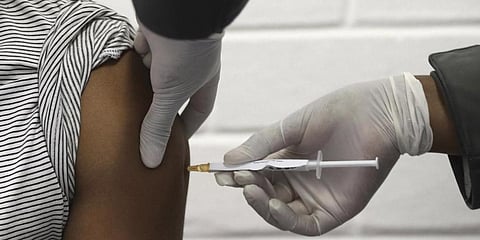

NEW DELHI: A day after the drug regulator greenlighted Covishield, a vaccine against Covid-19 produced by Serum Institute of India that could be the mainstay of the country’s immunisation drive at least initially, it emerged that the approval was for a dosing regimen that has not been tested in India so far.
In phase 2 and 3 trial design of the vaccine, originally developed by AstraZeneca-Oxford University, two doses were given 28 days or four weeks apart in India. But the regulator accorded permission for the second dose to be administered 4-12 weeks apart in its letter to the company.
Covishield and Bharat Biotech’s Covaxin were granted restricted emergency use (REU) authorisation in India on Sunday.
“The second dose should be administered between 4 to 6 weeks after the first dose,” the Drug Controller General of India’s letter said.
“However there is data available for administration of the second dose up to 12 weeks after the first dose from the overseas studies,” the letter added.
Experts pointed out that by allowing duration flexibility of up to 12 weeks, the regulator just followed the UK permission model to AstraZeneca’s vaccine.
“Clearly, a lot of rules have been relaxed in granting the REU to the vaccine and this may also be one of them,” said an ICMR scientist who did not wish to be named.
“Normally, vaccines or drugs are approved under the same dosing schedule under which they have been tested in the country.”
In the UK, the regulators decided to give the Oxford vaccine to people as one shot, followed by another up to 12 weeks later to extend protection to as many people as possible. But experts questioned the decision since there isn’t sufficient evidence to extend the time between injections to 12 weeks.
In India, SII presented to the regulator only the immunogenicity data from 185 of the proposed 400 volunteers as part of its phase 2 trial and no efficacy data from phase 3 trial, as per publicly available information.
Why regulatory nod to vaccines is under public scrutiny
Covishield
Serum Institute of India submitted immunogenicity data of only about 185 people from phase 2 trial
No efficacy data from the vaccine’s phase 3 trial in India
Dosing schedule with a 4-12 week gap permitted but the vaccine has been tested at a gap of only four weeks in India so far
Covaxin
Current enrolment for phase 3 trial is around 22,000 but no phase 3 efficacy data available or submitted
The regulator said that the rollout of the vaccine will be in ‘clinical trial mode’ but there is no explanation yet on what it means
A claim is being propagated that the Whole-Virion inactivated vaccine will be effective against mutations but this is not being supported by any evidence